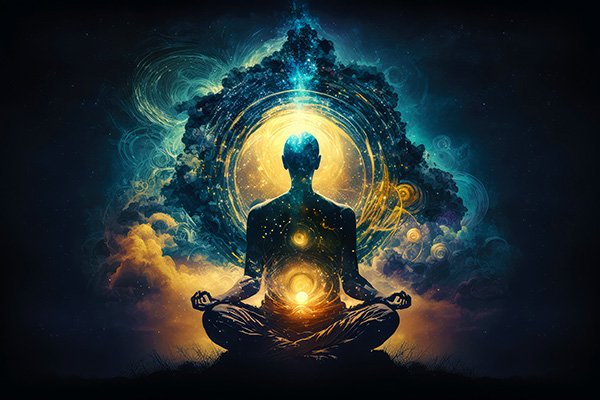emotional responses
Seeing The Spiritual Essence In Others
 My world was turned upside down when my father was diagnosed with pancreatic cancer. For seven agonizing months in 2005, I became his caregiver, managing the extreme emotional and physical toll of his illness.
My world was turned upside down when my father was diagnosed with pancreatic cancer. For seven agonizing months in 2005, I became his caregiver, managing the extreme emotional and physical toll of his illness.
Even the hospice staff, experienced in end-of-life care, commented at the time that my father was not an easy patient to care for. Their observation confirmed my own feelings on the matter and highlighted the unique challenges of the difficult karmic relationship I had with my father.
Throughout this stressful time, I held out hope for a miracle. I felt compelled to seek guidance, but unfortunately Spirit revealed a timeline of six to twelve months. This devastated me at the time, but I’ve since come to accept that arrivals and departures are part of every soul’s journey. Spirit was simply confirming a poignant truth: at some point we are all called home to the spirit realm.
Despite his resistance to any form of treatment, my father allowed a trusted colleague of mine, a master in his healing modality, to visit our home weekly for body alignment sessions. These sessions became a turning point — not only for my father, but for me as well.
During their second session, my healer friend shared an observation that struck a deep chord. He sensed an immense amount of bitterness and resentment in my father, energies he had perceived without any prior knowledge of my father’s emotional state or life history. He then offered me a piece of wisdom that changed the way I viewed not only my father, but all of my relationships: “Try to see only the true spiritual essence that is your father.”
How To Deal With Negativity And Toxic Drama
 Many people today feel overwhelmed, angry, frustrated, fearful. This is especially evident online in the social media landscape. Unfortunately, too often this leads to attacks on others, including innocent people and companies.
Many people today feel overwhelmed, angry, frustrated, fearful. This is especially evident online in the social media landscape. Unfortunately, too often this leads to attacks on others, including innocent people and companies.
It can be challenging to know how best to deal with all this toxic negativity. I believe it’s best to approach this issue spiritually, from a metaphysical or energetic standpoint.
Energy, whether positive or negative, grows when we feed it. Consider a plant: in order to thrive, it needs water, sunlight, and nutrients from the earth. If neglected, it will wither. The same principle applies to our interactions with the world around us: by paying attention to something, we feed it with our energy.
This is crucial to remember when dealing with any kind of negativity, both online and in person. To thrive energetically, we must be selective about who and what we pay attention to.
Huna, an ancient Hawaiian spiritual tradition, teaches that energy flows where attention goes. Every time we choose where to direct our energy, we’re making an active choice about what we want to grow in our lives. When we respond to negativity – whether with anger, defensiveness, or frustration – we end up reinforcing the very things we want to avoid. To maintain peace and harmony, huna advises focusing on positive intentions and constructive energy.
By giving toxic energy thieves our attention, we allow their negaivity to take root in our hearts and minds. Feeding negativity or drama only strengthens it, which ultimately affects our own well-being. When we consciously choose to withdraw our energy from negative influences and redirect it to uplifting and positive areas, we create an environment where peace and growth can flourish.
Always Choose Your Gut Over Your Heart And Mind
 We all have a higher purpose in this lifetime, and yet many never awaken to it, much less achieve it, because their ego has become more prominent in their lives than their higher self.
We all have a higher purpose in this lifetime, and yet many never awaken to it, much less achieve it, because their ego has become more prominent in their lives than their higher self.
How do you know if what you are doing is for your highest good? How do you make sure you are aligned with your soul purpose? How do you know if what you want out of life is based on your worldly desires instead of your spiritual mission in this lifetime?
Well, you listen to your inner guidance. You trust your intuition. You follow your gut.
When you were born, a deep-seated dream was placed within you. As children we are often more in touch with our true calling or purpose, but many of us lose that awareness as we grow older. Unfortunately, it has been buried by the expectations of society and the many distractions of the material world.
Often our parents, peers, teachers, and mentors play a significant role in this process of shutting down our spiritual awareness. Has anyone ever laughed at you when you told them what you wanted to do or be? Did someone say, “Go back and think about that because it will never happen”? Each of us has a different story as to why we do or don’t achieve our dreams in life.
Today is the day to decide, “I will achieve my dreams as long as they come from the spirit and are for my highest good.” It is time to look at your dreams for your life from a deeper perspective.
How To Embrace Your Shadow Self
 Most people tend to shy away from acknowledging their dark or “shadow” side when it comes to spirituality.
Most people tend to shy away from acknowledging their dark or “shadow” side when it comes to spirituality.
In fact, the tendency to avoid the uncomfortable aspects of the self is due in large part to our religious or spiritual background. Throughout history, most traditions have encouraged people to suppress, deny, or transcend their human flaws and shortcomings in favor of higher ideals such as purity, salvation, or enlightenment.
This reluctance to face the shadow within continues to this day, with modern spiritual and metaphysical communities often favoring light, love, and positivity while largely ignoring the messy, difficult, and painful aspects of the human experience.
But by avoiding the shadow within, we deny ourselves the opportunity for a deeper understanding of our soul’s purpose and untapped possibilities for personal and spiritual growth.
According to Carl Jung, the famous Swiss psychiatrist who pioneered the concept of the “shadow” in psychology, “one is not enlightened by imagining figures of light, but by making the darkness conscious.” Enlightenment isn’t about avoiding the shadow. Instead, it’s about facing it and integrating it into our being.
When we face the shadow within, we reclaim parts of ourselves that hold immense power, creativity, and insight. By delving into the deeper truths of our shadow selves, we can unravel the unconscious patterns that dictate our lives, allowing for true healing, transformation, and enlightenment.
Is Your Texting Pushing Him Away?
 A new client recently contacted me about a promising romantic relationship. The first thing that became clear as I began to read for her was that she had a long history of dating men who seemed like potential long-term partners, but then suddenly disappeared or broke up with her after only a few months.
A new client recently contacted me about a promising romantic relationship. The first thing that became clear as I began to read for her was that she had a long history of dating men who seemed like potential long-term partners, but then suddenly disappeared or broke up with her after only a few months.
It quickly also became clear to me that texting was a significant factor in her dating problems. Misunderstandings due to texting have damaged the romantic, family, and friendship relationships of many people I have worked with as a psychic professional. This client was no exception.
As I read the energy around her situation, I sensed that she had a tendency to push men away by unnecessarily panicking when she did not feel completely in control. Guys can sense panic and controlling tendencies and for most men this is usually a big turnoff.
This kind of negative energy is also stressful and doesn’t improve the outcome of an uncertain situation. Excessive obsession, panic, and worry will not bring someone closer to you; in fact, it can push a potential long-term relationship away forever.
I then had to tell her that while I did see the potential for a long-term relationship in their connection, I didn’t currently see a long-term future for them if she continued with all the texting she was doing. I told her to take a step back, breathe, stop worrying so much, and definitely not try to resolve things through texting any more.
Do You Have A Past Life Connection?
 Have you ever met someone and felt an instant connection that you couldn’t quite explain? Like you’ve known them forever, even though you just met? It’s that uncanny feeling of familiarity that makes you wonder if there’s more to your connection.
Have you ever met someone and felt an instant connection that you couldn’t quite explain? Like you’ve known them forever, even though you just met? It’s that uncanny feeling of familiarity that makes you wonder if there’s more to your connection.
Sometimes, you might even experience déjà vu, feeling like you’ve been with this person before in another time or place. Maybe you even have some mental flashes of moments together in a different time and place, making you realize there’s a deeper reason for your bond.
These intense feelings and responses often come from cellular energy imprints and soul memories from our past lives. When you encounter someone you feel this way about, it’s usually because there’s some unfinished karmic business or soul growth that needs to happen, which is why you’ve crossed paths with them again in this lifetime.
Certain souls meet repeatedly across different lifetimes to resolve unresolved issues or karmic debts. There’s work to be done, lessons to be learned, and sometimes it takes more than one lifetime to get it all sorted out.
But not all these encounters are rosy. They can come with relationship challenges, tension, and conflict. For instance, a betrayal in a past life might manifest as trust issues in the present. It’s a journey that can be tough, but also deeply meaningful and very healing.
Always Feel Free To Own Your True Feelings
 Has anyone ever told you that you are too happy? Or has anyone ever told you that you smile too much? My guess is probably never.
Has anyone ever told you that you are too happy? Or has anyone ever told you that you smile too much? My guess is probably never.
So, why is it that whenever we experience negative emotions, be it grief, despair, or depression, we are often told that there is a time limit to such feelings and that we need to get over it. In today’s society, it is essentially also taboo to express feelings of loneliness, sadness, fear, or simply being unhappy.
My brother died at the tender age of 12 and left such a void in our lives that my entire family grieved his loss for decades. Fortunately, we were raised to accept this as a perfectly normal and natural process for us. We all understood that we would work through our feelings of grief and loss in our own way and at our own pace. We did not grieve according to a schedule or set of societal rules.
I find that a useful way to think about feelings and how to process them is to think of our emotions as being processed by our heart and mind like food is processed by our body. Just like food, we need to break down, digest, and assimilate the lessons and insights in our emotions to serve as growth “nutrients” for the soul.